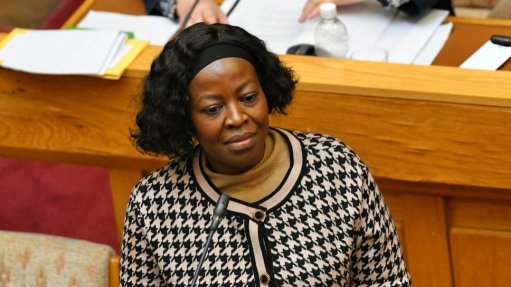
Minister in the Presidency of Planning, Monitoring, and Evaluation Maropene Ramokgopa
Minister in the Presidency Maropene Ramokgopa, who has taken over the coordination of State-owned enterprises (SOEs) that previously fell under the now dissolved Ministry of Public Enterprises, has urged lawmakers to support the timeous processing of the National State Enterprises Bill that includes far-reaching changes to the shareholder management model for SOEs.
Delivering her Budget Vote address, Ramokgopa promised to convene a workshop with the Portfolio Committee on Public Enterprises to finalise the passage of a “fit for purpose” piece of legislation.
She also reaffirmed that her Ministry of Planning, Monitoring and Evaluation, which resides in the Presidency, would be responsible for the coordination of Eskom, Transnet, Denel, South African Airways, Safcol and Alexkor following President Cyril Ramaphhosa’s decision to close the Ministry of Public Enterprises.
The decision to change the shareholder management model was based on a recommendation of the Presidential State-owned Enterprises Council (PSEC), which was established in 2020 to advise on the reform, repositioning, and revitalisation of SOEs, whose operational performance and financial position collapsed during the period of State capture.
The PSEC recommended that South Africa adopt a centralised shareholder management model and establish a holding company for strategic SOEs, which the Bill termed the State Asset Management Company.
Some of the provisions of the Bill, including the role of the State Asset Management Company, have been criticised, while some political parties have even indicated a preference for SOEs reporting to line departments, notwithstanding potential conflicts of interest between the policy and implementation functions.
Ramokgopa used the platform of the Budget Vote to espouse the benefits of a centralised shareholder management model, which she argued had the following advantages:
- a clear delineation of the policymaking, shareholding, and regulatory roles by the State in governing SOEs;
- greater coherence and consistency in the application of corporate governance standards across all SOEs; and
- greater transparency and accountability for SOE operations, by enabling uniform oversight and performance monitoring.
She also used the address to dismiss persistent arguments that the new model and the dissolving of the Public Enterprises Ministry were designed to facilitate privatisation.
“The objective of the Bill will be to ensure that the State is the sole shareholder of the holding company, so we are not privatising,” Ramokgopa stressed, adding that the shareholding of identified SOEs would be transferred to the holding company in phases.
“It will also provide for appropriate monitoring and reporting mechanisms over the subsidiaries,” she told lawmakers, some of which had expressed concern about whether the entities would remain accountable to Parliament.